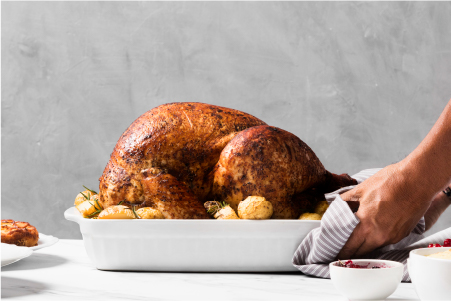EnvisioningHealth - Changing Lives One Idea at a Time | Health Dispatch
Food for thought:
healthy eating for healthy living
Embrace the festive season with healthier food choices to nourish
and delight, including a turkey recipe that is as nutritious as it is delicious.
Issue 3 | December 2023

As the year-end holidays draw near, the air is rich with the spirit of celebration. And of course—what’s the season of cheer and merrymaking without scrumptious meals and sweet treats? However, amidst the festivities, balancing our plates with choices that promote health and well-being becomes just as essential.
In Singapore, where the culinary landscape is as diverse as its culture, there is an increasing trend of favouring ultra-processed foods, particularly among the youth. In her keynote lecture at the third Singapore International Public Health Conference held in October 2023, former chief scientist of the World Health Organisation, Dr Soumya Swaminathan urged healthcare professionals to guide the youth away from a reliance on ultra-processed foods high in sugar, fat and salt.
"Multiple studies have found a direct correlation between the rise in consumption of ultra-processed foods and increase in incidence of childhood obesity, and also other chronic diseases affecting adults, such as
diabetes, heart disease and
stroke,” says
Dr Nicholas Ng, Consultant,
Division of Paediatric Endocrinology,
Department of Paediatrics, Khoo Teck Puat – National University Children's Medical Institute. “These foods have the tendency to stimulate the reward pathways in the brain, which may trigger addiction that drives an
excessive consumption of these food.”
Spice things up without the guilt
While the festive season is often a time of overindulgence, it’s also important to feast with health in mind. Here are some frequently asked questions that can help you and your child navigate your holiday feasting.
How can I make my festive meals healthier without sacrificing flavour?
Simple changes can make a huge difference. Opt for whole foods, load up on greens and choose lean proteins over fatty meats. Swap out refined grains for wholegrain varieties, use herbs and spices for seasoning rather than salt. Try baking or grilling over deep frying. Be mindful of sugar-sweetened beverages and confectionary which are often consumed in excess during festive meals.
These small steps can significantly enhance the nutritional value of your dishes while keeping them finger-licking good!
How can I encourage my children to eat healthy?
Encouraging children to participate in healthy eating goes a long way to build informed dietary choices as they grow up.
“Parents play a pivotal role in guiding their children’s eating habits by providing a range of nutritious choices and turning dining into a learning opportunity,” suggests Ms Charlotte Lin, Head, Department of Dietetics. “For instance, involving them in the cooking process can spark many valuable teaching moments that foster a lifelong appreciation for health-conscious eating. Children are also more inclined to adopt healthy habits when they see their parents making similar choices.”
Is there a healthy, festive main dish recommendation for the holidays?
Certainly! For a festive centrepiece that is as heart-healthy as it is hearty, try a turkey recipe that weaves in aromatic herbs and spices, promising a succulent roast without the excess calories commonly found in traditional recipes.
Make it a guilt-free highlight of your holiday spread!
While the holiday season brings an opportunity for healthy eating, parents should be mindful of food safety, particularly in light of the growing prevalence of food allergies—especially in children. In Singapore, there has been a noticeable uptick in children sensitive to staples such as eggs, milk and peanuts. NUH reported a significant rise in hospital visits for children with food allergies from around 300 cases in 2014 to 10,000 in 2022. This rise not only affects individuals with allergies but also places a strain on families and the healthcare system, underscoring the need for targeted strategies to manage and prevent these conditions.
Efforts at NUH are underway to better understand and address this growing concern. Researchers are studying the immunological changes in patients who have undergone oral immunotherapy—a treatment designed to increase tolerance to allergens—and documenting their improvement in quality of life.
“We are carrying out new research to discern the patterns and causes of food allergies in Singaporean children, which will guide more effective prevention and treatment,” says Dr Elizabeth Tham, head and consultant of the Division of Paediatric Allergy, Immunology and Rheumatology at NUH’s Khoo Teck Puat – National University Children’s Medical Institute. “As we witness a rising trend in food allergies, our goal is to ensure that safety becomes a key ingredient in every meal.” |
Like this article? Simply subscribe to make sure you don't miss the next issue of EnvisioningHealth!
